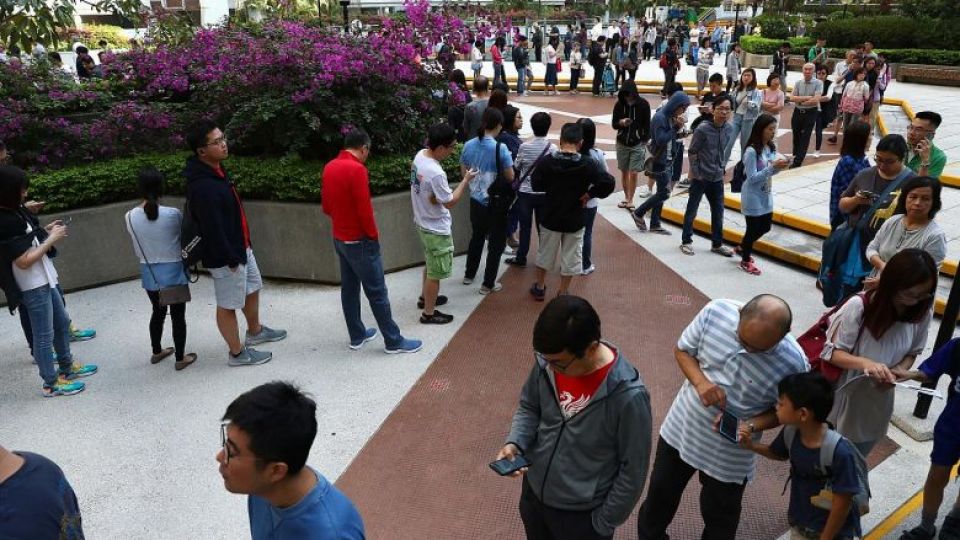November 25, 2019
Many say events of past 5 months galvanised their desire to exercise their democratic right.
Amid mild autumn weather and under a clear blue sky in Lek Yuen, the oldest public housing estate in Hong Kong’s Sha Tin, a snaking queue formed outside the community hall shortly after dawn yesterday.
It was the constituency’s polling station of the day, and hundreds were in the line before the opening time of 7.30am to vote for their district councillor, one of the lowest rungs of Hong Kong’s elected offices.
The scene was repeated across the territory’s 18 districts, where nearly three million people showed up to vote in elections that are usually a quiet affair, with chosen officials confined to dealing with noise complaints and local infrastructure improvement projects.
The officials, however, also represent 117 of the 1,200-strong Election Committee that chooses the city’s Chief Executive.
In many areas, the queues continued throughout the day but had a lag around noon, with the sun at its hottest.
While the wait to cast their votes was much longer than in past years, many said the events of the past five months have galvanised their desire to exercise their democratic right, no matter their political beliefs, amid a cautious optimism that the polls could mark a turning point in the city’s pro-democracy movement.
“I waited almost 45 minutes as the sun was getting hot, but it’s the least I can do since I always take part in peaceful protests. So this is yet another example of my civic duty,” said a retired mental healthcare worker in Sha Tin who wanted to be known only as Anthony.
The 69-year-old, who was walking with the aid of a stick, said he came to the town centre from his home in the surrounding hills, where he has lived for the past three decades.
Nestled in a valley between two mountains, the area in the New Territories region has a mix of high-end properties, public housing, a race track and a university with a strong history of activism.
The elections come at a time when the city has been convulsed by often violent protests sparked by a now-withdrawn extradition Bill.
Tensions reached a feverish pitch two weekends ago as police laid siege to The Hong Kong Polytechnic University, where student protesters had barricaded themselves in forming a fortress of sorts, a repeat of scenes from earlier in the week at The Chinese University of Hong Kong in Sha Tin.
As street battles raged across parts of Kowloon by those who tried to rescue the trapped students, schools were cancelled after major roads were blocked by protesters. Many companies allowed employees to work from home in the light of the traffic disruption.
After the authorities warned that polls might be cancelled, the city returned to relative calm over the past five days, but it remains to be seen whether this will hold.

In a city where the people do not get to elect their leaders, the elections are also seen as a barometer of public opinion of the government.
“Despite all the drastic and upsetting changes in Hong Kong, being able to vote is like regaining a glimpse of hope for those who really love Hong Kong,” said Ms Serena Ho, 32, who works in publishing. “It’s something that we can do together to fight in a peaceful way.”
She said that in the Tai Koo Shing area on east Hong Kong Island where she lives, there were “human alarm clocks” helping to wake residents up at 7.30am so they could go to the polling stations early.
But for some, there are fears that a victory for the pro-democracy camp could mean a society that now condones violence.
Teacher Cathy Fung, 46, who lives in Yuen Long in the New Territories, said she has tried to convince some of her younger colleagues that being pro-Beijing is not all that bad.
“After all, this is a country that has lifted so many people from poverty, and we are historically a part of it. Are Western democratic ideas that much better?” she said.
In Lek Yuen, many showed up to support candidate Jimmy Sham, a popular pro-democracy figure who was twice attacked by thugs in the past three months.
The latest incident landed him in hospital for nearly a week, and as he canvassed last-minute votes outside the local market, a steady stream of supporters – mostly locals living around the area – went up to him to take pictures and offer support.
Among them were students Michelle Tsang, 27, and Yiu Tsang, 22, who posed for photos with him.
Both women, who live in the same block in Lek Yuen, said many of their peers have had a “political awakening” after months of protests.
“Hong Kongers have gone through too many things that make us sad… so I believe everyone treasures the one vote that they have, because it’s representative of what we are fighting for,” said Miss Michelle Tsang.
Mr Sham said the elections are also a way to bring peace back to society in a democratic manner.
Asked whether he was worried for his safety after two attacks, he replied “of course!” without hesitation.
“There is no way to escape from threats, but I get to choose how I want to go forward, we get to choose how society moves forward,” he said.


